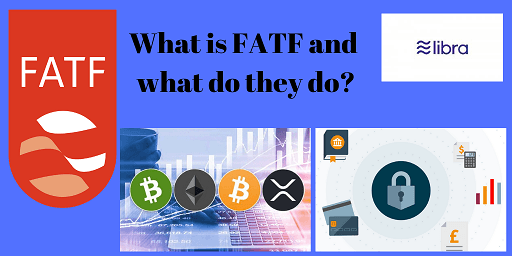What is FATF and what do they do?

As the leading cryptocurrencies show signs of significant recovery a lot of talk has centered around the question of what is FATF. Many attribute the rapid call to action by the FATF to the announcement of Libra coin by Facebook. Others see it is a reaction to the surge in privacy coins and a follow on from the recent talk of banning mining coins. So what is FATF and what do they do?
What is FATF and what do they do
The Financial Action Task Force (FATF) was set up in 1989 by the Ministers of its Member jurisdictions, and is an inter-governmental body. The objectives of the FATF are to set standards and promote effective implementation of legal, regulatory and operational measures for combating:
- money laundering
- terrorist financing
- other related threats to the integrity of the international financial system
These are accomplished through a series of recommendations to the member governments. As such the FATF has developed a series of Recommendations that are recognized as the international standard for combating of money laundering and the financing of terrorism and proliferation of weapons of mass destruction. These recommendations have been updated a number of times since it’s inception (1996, 2001, 2003, 2012) in order to maintain their relevance in being up to date. Crypto specific recommendations were issued in October 2018 and June 2019. The announcement of the launch of Libra coin triggered the FATF to issue a guidance (PDF.) document.
As a policy making body it aims to garner the support of it’s member states to generate the political implementation of national legislative and regulatory reforms tackling these points.
The FATF currently comprises 36 member jurisdictions and 2 regional organizations, representing most major financial centers in all parts of the globe.
FATF Member Jurisdictions
| Argentina | France | Japan | Russian Federation |
FATF Observers
| Indonesia |
Does the FATF have powers of enforcement?
We are seeing a lot of panic among the social media communities about this very question. Many are speaking out saying that the FATF can’t do anything, others are fearing a mass shutdown of their privacy. Important to note in this respect is the statement which can be found on their website:
The FATF is an international policy-making body. It does not take a role in law enforcement matters, investigations or prosecutions. If you are aware of a case that you believe may be related to money laundering, you should contact your local authorities, in particular the Financial intelligence unit of your country (such as FinCEN in the USA, NCA in the UK, Tracfin in France).
However, within the member countries the FATF has a power to oversee the implementation of the recommendations, and given that the members are responsible for drawing up the recommendations it is safe to say that these will be enforced nationally where possible. In fact inm a recent statement the FATF released the following note in respect to virtual assets:
Further, INR. 15 requires countries to ensure that service providers also assess and mitigate their money laundering and terrorist financing risks and implement the full range of AML/CFT preventive measures under the FATF Recommendations, including customer due diligence, record-keeping, suspicious transaction reporting, and screening all transactions for compliance with targeted financial sanctions, among other measures, just like other entities subject to AML/CFT regulation. This includes coordination with relevant authorities to ensure the compatibility of AML/CFT requirements with Data Protection and Privacy rules and similar provisions. Also today, the FATF published updated Guidance for a Risk-Based Approach to Virtual Assets and Virtual Asset Service Providers, which builds upon the FATF’s ground-breaking 2015 guidance paper, to further assist countries and providers of virtual asset products and services in understanding and complying with their AML/CFT obligations.
This statement has come in for most of the pushback from the general public, in particular the concern about this being in breach of the new European privacy laws and resulted. Commercial ventures are also expressing points of concern in regard to the EU privacy, the main one being point 7(b):
7. With respect to preventive measures, the requirements set out in Recommendations 10 to 21 apply to VASPs, subject to the following qualifications:
(b) R.16 – Countries should ensure that originating VASPs obtain and hold required and accurate originator information and required beneficiary information2 on virtual asset transfers, submit the above information to beneficiary VASPs and counterparts (if any), and make it available on request to appropriate authorities. It is not necessary for this information to be attached directly to virtual asset transfers. Countries should ensure that beneficiary VASPs obtain and hold required originator information and required and accurate beneficiary information on virtual asset transfers, and make it available on request to appropriate authorities. Other requirements of R.16 (including monitoring of the availability of information, and taking freezing action and prohibiting transactions with designated persons and entities) apply on the same basis as set out in R.16
Bitonic, a crypto company based in the Netherlands was present when the Draft recommendations were presented in February of this year issued a statement about this on May 10th 2019. The key point for us in this statement is:
We have subscribed to an industry point of view, that seeks to ensure that the European model from the fifth money laundering directive is used as the basis for all control measures. This means that customer information about crypto transactions is only made available to supervisors and police authorities on the basis of a specific request or observed risk.
If adhering to the more stringent recommendations put forward by the US authorities, the FATF would indeed be in direct conflict with EU privacy, and the model suggested above is a far less invasive approach but nonetheless significant in terms of powers to monitor suspicious activity.
Will the FATF succeed in pushing through these measures
We are by no means experts in the field of law but have observed a number of such voluntary agencies at first hand, and the setup of the FATF would lead us to believe that the members will do everything they can to ensure it’s implementation. Combine this with the Finance Ministers and Central Bank Governors at the G20 meeting in Fukuoka having welcomed and expressed their support for the FATF’s actions on the regulation and oversight of virtual assets and virtual asset service providers, and you have to have a strong feeling that change is imminent.
Indeed the follow up on these recommendations has already been issued by the FATF:
The threat of criminal and terrorist misuse of virtual assets is serious and urgent, and the FATF expects all countries to take prompt action to implement the FATF Recommendations in the context of virtual asset activities and service providers. The FATF will monitor implementation of the new requirements by countries and service providers and conduct a 12-month review in June 2020.
With a big week for cryptocurrencies and their regulations coming up at the G-20 in Fukuoko, the FATF and other crypto regulations are something that we will be following very closely.
Update 01/07/2019:
As mentioned in the original text of this article the G20 summit were to discuss crypto and the FATF. This update to the article centers on the statement issued by the G20 leaders.
17. Technological innovations can deliver significant benefits to the financial system and the broader economy. While crypto-assets do not pose a threat to global financial stability at this point, we are closely monitoring developments and remain vigilant to existing and emerging risks. We welcome on-going work by the Financial Stability Board (FSB) and other standard setting bodies and ask them to advise on additional multilateral responses as needed. We reaffirm our commitment to applying the recently amended FATF Standards to virtual assets and related providers for anti-money laundering and countering the financing of terrorism. We welcome the adoption of the Financial Action Task Force (FATF) Interpretive Note and Guidance. We also welcome the FSB’s work on the possible implications of decentralized financial technologies and how regulators can engage other stakeholders. We also continue to step up efforts to enhance cyber resilience.
18. We welcome the United Nations Security Council Resolution 2462, which stresses the essential role of the FATF in setting global standards for preventing and combatting money laundering, terrorist financing and proliferation financing. We reiterate our strong commitment to step up efforts to fight these threats, including by strengthening the FATF’s global network of regional bodies. We call for the full, effective and swift implementation of the FATF Standards.
19. An open and resilient financial system, grounded in agreed international standards, is crucial to support sustainable growth. We remain committed to the full, timely and consistent implementation of the agreed financial reforms. We ask the FSB to continue to evaluate their effects. We will continue to monitor and, as necessary, address vulnerabilities and emerging risks to financial stability, including with macroprudential tools. While non-bank financing provides welcome diversity to the financial system, we will continue to identify, monitor and address related financial stability risks as appropriate. We welcome the work on market fragmentation, and will address its unintended, negative effects, including through regulatory and supervisory cooperation. We continue to monitor and address the causes and consequences of the withdrawal of correspondent banking relationships. Mobilizing sustainable finance and strengthening financial inclusion are important for global growth. We welcome private sector participation and transparency in these areas.
Relevant news
Ethereum Casinos
Ethereum Casino: Of all the cryptocurrencies out there on the net, Ethereum is one of…

Online gambling at crypto currency casinos
Online gambling at cryptocurrency casinos is growing ever more popular, here is some background information…

MuchBetter Casinos
If you’ve played at casinos for any length of time, we’re relatively sure that you’ll…

MoonPay Casinos
MoonPay is not a payment provider that you may be familiar with. That’s okay –…

MiFinity Casinos
If you play at casinos regularly, you will undoubtedly have come across MiFinity before. This…

CoinsPaid Casinos
CoinsPaid is one of the more commonly found payment options at cryptocurrency-friendly betting sites. What…
